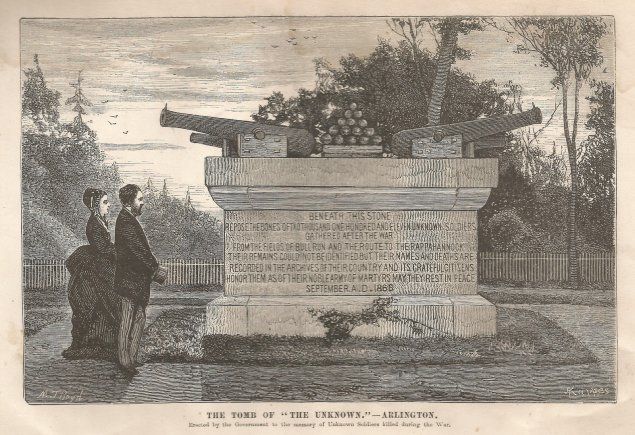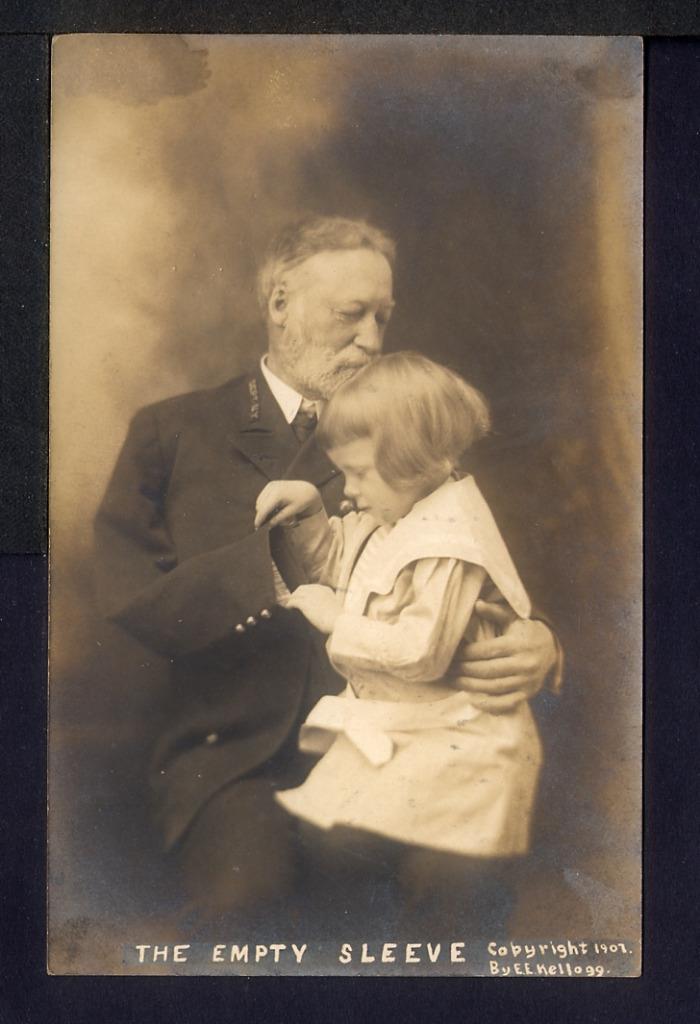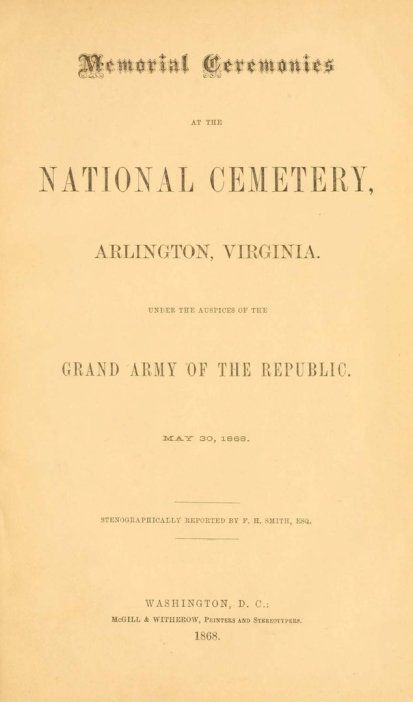Headquarters, Grand Army of the Republic
Washington, D.C., May 5, 1868
General Order No. 11
I. The 30th day of May, 1868, is designated for the purpose of strewing with flowers or otherwise decorating the graves of comrades who died in defense of their country during the late rebellion, and whose bodies now lie in almost every city, village, and hamlet churchyard in the land. In this observance no form or ceremony is prescribed, but posts and comrades will in their own way arrange such fitting services and testimonials of respect as circumstances may permit.
We are organized, comrades, as our regulations tell us, for the purpose, among other things, "of preserving and strengthening those kind and fraternal feelings which have bound together the soldiers, sailors, and marines who united to suppress the late rebellion." What can aid more to assure this result than by cherishing tenderly the memory of our heroic dead, who made their breasts a barricade between our country and its foes? Their soldier lives were the reveille of freedom to a race in chains, and their death a tattoo of rebellious tyranny in arms.
We should guard their graves with sacred vigilance. All that the consecrated wealth and taste of the Nation can add to their adornment and security is but a fitting tribute to the memory of her slain defenders. Let no wanton foot tread rudely on such hallowed grounds. Let pleasant paths invite the coming and going of reverent visitors and fond mourners. Let no vandalism of avarice or neglect, no ravages of time, testify to the present or to the coming generations that we have forgotten, as a people, the cost of a free and undivided republic.
If other eyes grow dull and other hands slack and other hearts cold in the solemn trust, ours shall keep it well as long as the light and warmth of life remain in us.
Let us, then, at the time appointed, gather around their sacred remains and garland the passionless mounds above them with the choicest flowers of springtime; let us raise above them the dear old flag they saved from dishonor; let us in this solemn presence renew our pledges to aid and assist those whom they have left among
us as sacred charges upon the Nation's gratitude,--
the soldier's and sailor's widow and orphan.
II. It is the purpose of the Commander-in-Chief to inaugurate this observance with the hope it will be kept up from year to year, while a survivor of the war remains to honor the memory of his departed comrades. He earnestly desires the public press to call attention to this Order, and lend its friendly aid in bringing it to the notice of comrades in all parts of the country in time for simultaneous compliance therewith.
III. Department commanders will use every effort to make this order effective.
By command of:
JOHN A. LOGAN N. P. CHIPMAN
Commander-in-Chief Adjutant-General
"Memorial Day is the choicest in the calendar of the Grand Army -
a day of sweet remembrance,
dear to every loyal heart,
and any violation of its sacredness
by making it the occasion for frivolity and amusement,
such as characterize the Fourth of July,
should be treated as an indignity
to the Comrades who died
that this country might live."
John S. Kountz
Commander-in-Chief
Grand Army of the Republic
1885
MEMORIES OF THE PAST.
The Day Intended for Appropriate
Commemoration of the Deeds
of Heroes.
Memorial day was founded that
there might be a few hours in each
year set aside for the appropriate
commemoration of the deeds of men
who had been kllled while serving the
country in the army or navy or who
had died since having so served. For
a number of years it was generally
and suitably observed. Then in some
places it ceased, to be observed at all.
In many it was given up to bicycle
and horse racing and other sports and
festivities.
Diversions of this kind have been
widely and properly protested against
as desecrations of the day. The protests
seem to have had some effect
for observance of the occasion promises
to be more general this
year than usual but also more appropriate,
Contemplation of the courageous and
self-sacrlflclng patriotism exhibited by
past generations is to little purpose
if it does not imbue their successors
with a purpose to emulate them.
The men of to-day have confronting
them questions almost as difficult as
any which have yet been dealt with,
and the best way the sons can show
their appreciation of what the fathers
accomplished is by resolving to go
about their work as citizens with the
same courage and In the same spirit
as their fathers went about theirs.
—
The
Daily Freeman Tribune, Webster City, May 31, 1906
Dubuque Daily Herald
Dubuque, Iowa
31 May 1868
Page 3
Decoration of Graves
Tribute to Dead Soldiers
Address By Gen. Vandever
List of Graves Decorated with Flowers
Interesting and Impressive Ceremonies
On the 5th day of May Gen. John A. Logan commander-in-chief of the organization known as the Grand Army of the Republic, issued an order directing that on the 30th of May the organization, throughout the United States, should decorate the graves of soldiers who died during the late war. In accordance with this order the organization throughout the country on Saturday, the 30th, was engaged in strewing beautiful flowers upon the graves of dead heroes, a tribute beautiful and sacred to the purpose to render honor to men who died in a conviction of duty. In this city the ceremonies were complete, and performed in a spirit which reflects honor upon the living no less than it crowned the glory of the dead.
In accordance with arrangements previously made, a squad of cavalry assembled upon call at Washington square at eight o'clock in the morning, and under command of Lieut. Col. Pollock proceeded to the cemeteries at Key West, Center Grove, Rockdale, and on Kelly's Bluffs, and strewed the graves of soldiers in those burial places with flowers. The graves in these cemeteries are of the following soldiers:
KEY WEST CEMETERY
Geo. Carroll, (no entry),
Morris Nagle
3rd Iowa battery, A. Cosgrove
37th Iowa Infantry,
Wm. Barnes
(no entry)
~~ ** ~~
CITY CATHOLIC CEMETERY
M'Manus
Third Iowa Infantry
~~ ** ~~
CENTER GROVE CEMETERY
Lieut. D. G. Cook
21st Iowa Infantry,
Thomas Lockey
21st Iowa Infantry,
~~ ** ~~
ROCKDALE CEMETERY
John G. Skaife
21st Iowa Infantry,
(blank) Frost
Pennsylvania regiment Mexican War, Wm. Lourinde
38th Iowa Infantry
But the imposing ceremonies of the day were appointed for the afternoon, and were performed at Linwood cemetery. At 2 o'clock p.m., soldiers and civilian citizens assembled at Washington square. The Germania band, and martial music, were in attendance. Horsemen, and footmen, and people in carriages gathered, all bearing bouquets and wreaths of flowers as offerings and testimonials to the brave departed.
The procession was formed under the following officers:
Chief Marshal:
Maj. John McDermott
Assistant Marshals:
Col. Theodore Stimming
Capt. P. W. Crawford
Lieut. Camp.
Commander of Cavalry:
Lieut. Col. Pollock.
The order of procession was: First, mounted men; then followed the band; then footmen, and then carriages. Flags were appropriately distributed through the procession. The procession as it passed the City Hall consisted of forty-seven mounted men, seventy-seven men on foot, and thirty-five carriages. A large number of carriages, as well as citizens on foot, had preceded the procession to the cemetery.
The order of march was as follows: Down Locust street to First; along First to Main; up Main to Eleventh; down Eleventh to Clay; up Clay and Couler avenue to Eagle Point, thence to the cemetery.
At the Cemetery.
The procession entered Linwood by the western entrance and formed facing the east. Gen. Vandever, who had been selected to deliver the address, occupied an eminence overlooking the congregation, and spoke as follows:
Gen. Vandever's Address.
"Comrades and Friends -- The sad mementoes before us, call vividly to our minds the harrowing events and bloody sacrifices of the late war for the suppression of a wicked rebellion. Standing to-day at the portal of the grave, between the living and the dead, we will renew our vows of devotion to the country and the flag they have died to defend. While we drop a tear in sorrow for the untimely fate of fallen comrades and friends, we will cherish their memories in our hearts, emulate their heroism and virtue, and dedicate ourselves afresh to perpetuate the principles of liberty they have consecrated by the sacrifice of their lives.
The list of deceased soldiers whose remains repose beneath our feet constitute a "Roll of Honor" emblazoned by imperishable deeds of valor and devotion to country. Here and there a grave is marked "unknown." We can only tell that its occupant was a patriot who, wan and crippled from the field of strife, struggling to regain his home, reached the confines of our state, and destined never again to behold the face of wife or child, sank exhausted into the embrace of death. Stranger though he was, the sympathizing tear and tender touch of a woman was not denied him at the last hour, for there are those among us who withheld not a mother's or a sister's part from the returning veteran, but smoothed his pillow and caught his last expiring breath. May heaven reward and bless them.
The tenants of these graves, whom we knew in life, I need not name. They live in our affections with a freshness and verdure that knows no winter. We meet to-day to strew alike the grave of the known and unknown with the fragrant garlands of returning spring. It is a fitting expression of the affection we cherish for their memories; a tribute of admiration to heroic virtue and noble service.
While engaged in this interesting ceremony, our minds revert to the thousands who went forth never to return, not even for sepulcher. The remorseless wave which deluged the land with blood cast a few mangled forms back at our feet, but the great multitude it gave not up, but hid forever from our sight. They lie for the most part where they fell, in undistinguishable groups upon every battle field, shrouded only in the habiliaments of the soldier. And some, alas, murdered by the slow tortures of some infernal dens as Libby and Andersonville, yielded their emaciated bodies a scanty repast to the rebelling worm -- their terrible fate adding the bitterest dreg to fill the iniquitous cup of the sum of all villainies.
Oh, what a wail breaks from the heart of the nation this day, as mournful groups gather in every city, village and hamlet in the land to cast flowers upon the graves of departed heroes, and mingle tears with the dust of the dead. Many hearts renew their sorrows today; the nation weeps, but heaven be praised for the hopes of the future; there is a resurrection to renewed national life, in which traitors and tyrants can have no part, but at which they may well call upon the rock to hide them."
At the conclusion of Gen. Vandever's address the band discoursed appropriate music. Then a prayer, of rare power and eloquence was offered to heaven, by Rev. L. Whiting, pastor of the Congregational church of this city.
The procession then reformed, the cavalry dismounting, and proceeded under the guidance of Dr. Watson to the graves of the soldiers, where flowers were scattered alike upon the last resting place of private and officer, the known and unknown hero. Where loving hands and sorrowing hearts had deposited the worn out or broken body of a darling whose life had been sacrificed in battle, or been wasted in the disease of the camp, now come other hands lovingly, and other hearts honoring, to testify the appreciation by the living of the heroic dead, and where the stranger had been buried by strangers the testimonial was equally given because no less deserved. At each grave the column halted, the name and regiment of the dead, when known, were announced by Dr. Watson, and while heads were uncovered the flowers were strewn. The following is a list of the graves thus decorated:
LINWOOD CEMETERY
Lieut J. F. Conyngham 24th U. S. Infantry,
Joseph Turner 5th Iowa cavalry,
Capt. S. S. Newberry 12th U. S. Inft,
Lieut. J. L. Harvey adjt, 46th Iowa,
Sergt. James McDermott 1st Iowa cavalry,
T. J. Knowlton 8th Iowa cavalry,
Col. J. B. Dorr 8th Iowa cavalry,
Stephen Barton 21st Iowa Inft, Lieut. Geo. W. Cumins 37th Iowa Inft,
Ulrich Brassler
1st Iowa Inft,
L. D. Cook 8th Iowa Inft,
Simon Lannica 16th Iowa Inft,
James Graham 5th Iowa cavalry,, (blank) Gilbert (blank),
Two Unknown from hospital,
John Luthe 46th Iowa Inft, John Gaston 14th Iowa Inft., Geo. King 90th N. Y. Inft,
Ernest Amberg 1st Iowa Inft, Wm. H. Gunn 1st Iowa cavalry,
Henry Laufler
1st Iowa Inft, John Litrell (blank),
Two Unknown
of 21st Iowa Inft.,
Carl Shaffer Bernstein major 5th Iowa cav, Dan'l McCartney 100th colored, Gen. Henry
(blank)
(blank) Alling (blank),
Henry Kroll 46th Iowa Inft.,
L. N. Converse 46th Iowa Inft., F. H. Duncan 14th Penn. cav.
G. W. Barnes 42d Ills. Inft., W. L. Shankland 5th Iowa cavalry, Henry Madorf (blank)., N. McDaniel (blank)
Lieut. Stillman Smith 14th Iowa Inft.
Having concluded the ceremonies of decorating the graves of soldiers the procession was disbanded, and all dispersed.
~ Transcribed and contributed by Joe Conroy
Memorial Day is an American holiday, observed on the last Monday of May,
honoring the men and women who died while serving in the U.S. military. Originally
known as Decoration Day, it originated in the years following the Civil War and became
an official federal holiday in 1971. Many Americans observe Memorial Day by visiting cemeteries or memorials, holding family gatherings and
participating in parades.
The Civil War, which ended in the spring of 1865, claimed more lives than any
conflict in U.S. history and required the establishment of the country's first national
cemeteries.
By the late 1860s, Americans in various towns and cities had begun holding
springtime tributes to these countless fallen soldiers, decorating their graves with
flowers and reciting prayers.
On May 5, 1868, General John A. Logan, Commander-in-Chief of the Grand
Army of the Republic, called for a nationwide day of remembrance later that month.
“The 30th of May, 1868, is designated for the purpose of strewing with flowers, or
otherwise decorating the graves of comrades who died in defense of their country
during the late rebellion, and whose bodies now lie in almost every city, village and
hamlet churchyard in the land,”
he proclaimed. The date of Decoration Day, as he
called it, was chosen because it wasn’t the anniversary of any particular battle.
On the first Decoration Day, General James Garfield made a speech at Arlington
National Cemetery, and 5,000 participants decorated the graves of the 20,000 Union and Confederate soldiers buried there.
Many Northern states held similar commemorative events and reprised the tradition in subsequent years; by 1890 each one had made Decoration Day an official state holiday.
Southern states, on the other hand, continued to honor their dead on separate days until
after World War I.
For decades, Memorial Day continued to be observed on May 30, the date Logan
had selected for the first Decoration Day.
But in 1968, Congress passed the Uniform
Monday Holiday Act, which established Memorial Day as the last Monday in May in
order to create a three-day weekend for federal employees; the change went into
effect in 1971. The same law also declared Memorial Day a federal holiday.
Some Americans still observe Memorial Day by visiting cemeteries and memorials, most, however, take weekend trips or throw parties and barbecues on the holiday, perhaps because it unofficially marks the beginning of summer.
www.history.com/topics/holidays/memorial-day-history
Traditional observance of Memorial Day has diminished over the years and many Americans have forgotten the meaning and traditions of the day. At many cemeteries, the graves of the fallen are increasingly ignored or neglected. Most people no longer remember the proper flag etiquette for the day. While there are towns and cities that still hold Memorial Day parades, many have not held a parade in decades.
We in the Sons of Union Veterans of the Civil War (and all of the Allied Orders) are charged by all of these heroes of our Nation to honor and remember them and their families. There are a great many Americans who do this, but not enough in our opinion. There are many Americans today who simply look at Memorial Day as a long weekend, instead of a day of reflection, honor and remembrance. It is our Charge and Duty to bring the stories of our Service personnel to the minds and ears of the American (and world) public.
Only by doing this are we carrying on their message of Country before self, that they so nobly advanced. They valued their way of life and their Nation before themselves and laid down their lives to prove it. As President Abraham Lincoln so eloquently stated in his Address at Gettysburg “-that from these honored dead we take increased devotion to that cause for which they gave the last full measure of devotion”.
The Sons of Union Veterans of the Civil War actively encourages
the restoration of Memorial Day to May 30.




